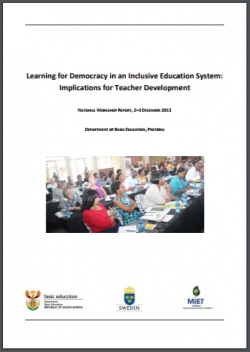The fundamental rights of learners within inclusive education: an educational-juridical perspective

Type
Thesis
Authors
Category
ECCE, Foundation, Intermediate
[ Browse Items ]
Publication Year
2007
Publisher
North West University, Potchefstroom, South Africa
URL
[ private ]
Pages
358 p.
Subject
Early childhood education, Primary education, Secondary education, Inclusive education, Learners, Human rights, Law, Legislation, South Africa
Tags
Abstract
The increasing international acknowledgement of fundamental human rights has resulted in a dynamic movement in South Africa aimed at recognising the fundamental rights of, inter aha, learners. The Constitution of the Republic of South Africa, Act 108 of 1996 founded South Africa as a democratic country based on the values of human dignity, the achievement of equality, and the advancement of human rights and freedoms. As such, a duty is placed on the State to provide for the realisation of individual fundamental rights while prohibiting the State to violate such rights. Guaranteed fundamental rights are of immense importance since they enable human beings and thus learners, to stand tall with dignity and be respected for who they are. The values contained in the Constitution expect all South Africans to take up the responsibility and challenge of building a humane and caring society, not for the few, but for all South Africans. In order to give effect to the fundamental rights of learners and to lead each one to realise his/her full potential, an inclusive educational system is proposed as the one best system. In light hereof, the main objective of this study is to establish whether the fundamental rights of all learners can be addressed within an inclusive education system. Since the realization of fundamental rights in practice presents an alarming challenge, this thesis aims at providing an educational-judicial perspective on inclusive education by means of a literature and comparative school law study between South Africa, the United States of America and the United Kingdom in order to establish whether these challenges can be met in South Africa. All chapters are organised into sections to enable thematic clustering of information on various legislative provisions, court interpretations, learner diversity, expectations, as well as on practical implications. Each chapter is preceded by a brief introduction, followed by a coherence of different views on inclusion, threaded with rich comments on inclusive education and pursued by a brief summary. Throughout the text, various sections are cross-referenced to alert the reader that a particular concept is discussed elsewhere. The importance and relevance of the study are highlighted in Chapter 1. In order to comprehend the nature and extent of learners' fundamental rights fully, Chapter 2 focuses on international documents and, to a greater degree, on the SA Constitution as the supreme law in South Africa. Existing educational policies, subsequent legislation, and accompanying White Papers, propounding the profound impact which the fundamental rights of all learners in South Africa should have, are discussed in Chapter 3. These documents are important to take cognizance of as they represent the basis for the establishment and coordination of an inclusive education system. Chapter 4 aligns a discussion on the ideals behind inclusion with a picture of the expectations that it creates in practice. The aim in this chapter is to straddle the theory-practice divide, seeking at all times to look both to theory and practice – to keep in mind the strong principles behind the move to inclusion while observing the practical challenges to be met. It is intended to inform the theoretical discussion, contained in Chapters 2 and 3, with the expectations of all role players, and to examine practical implications in the context of the theoretical discussion. The difficulties and challenges, successes and failures of inclusive education in light of the experiences of the United States of America and the United Kingdom are examined in Chapter 5 to make recommendations, as set out in Chapter 6, for the successive movement to inclusive schools in South Africa.
Number of Copies
1
| Library | Accession No | Call No | Copy No | Edition | Location | Availability |
|---|---|---|---|---|---|---|
| 1 | Potchefstroom, North West Province, South Africa | Yes |
